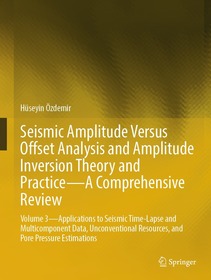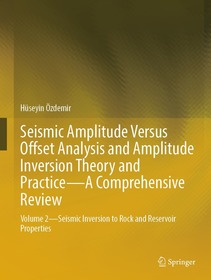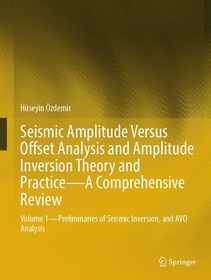
Seismic Amplitude Versus Offset Analysis and Amplitude Inversion Theory and Practice—A Comprehensive Review
Volume 3—Applications to Seismic Time-Lapse and Multicomponent Data, Unconventional Resources, and Pore Pressure Estimations
- Publisher's listprice EUR 213.99
-
88 752 Ft (84 526 Ft + 5% VAT)
The price is estimated because at the time of ordering we do not know what conversion rates will apply to HUF / product currency when the book arrives. In case HUF is weaker, the price increases slightly, in case HUF is stronger, the price goes lower slightly.
- Discount 12% (cc. 10 650 Ft off)
- Discounted price 78 102 Ft (74 383 Ft + 5% VAT)
Subcribe now and take benefit of a favourable price.
Subscribe
88 752 Ft

Availability
Not yet published.
Why don't you give exact delivery time?
Delivery time is estimated on our previous experiences. We give estimations only, because we order from outside Hungary, and the delivery time mainly depends on how quickly the publisher supplies the book. Faster or slower deliveries both happen, but we do our best to supply as quickly as possible.
Product details:
- Publisher Springer Nature Switzerland
- Date of Publication 7 December 2025
- Number of Volumes 1 pieces, Book
- ISBN 9783031836305
- Binding Hardback
- No. of pages457 pages
- Size 279x210 mm
- Language English
- Illustrations X, 457 p. 584 illus., 513 illus. in color. Illustrations, black & white 700
Categories
Long description:
This book provides an extensive critical review of seismic inversion methods and applications. Hydrocarbon reservoir extensions and properties cannot be accurately defined from information provided by geological data, geophysical data, and well log data. Seismic data has adequate spatial coverage but lacks vertical resolution, while well data has excellent vertical resolution but spatially sparse. Seismic reflection amplitudes are related to pore fill and lithology changes. Seismic AVO analysis and inversion exploit variation of amplitudes with angle of incidence to derive useful attributes and elastic rock properties such as velocity, impedance, and density. Seismic inversion attempts to fill the gap between and away from the already drilled wells with rock properties that are available from the measured and/or interpreted well log data. In this endeavour, seismic data, well log data, and all available geological model data are integrated to predict rock and ultimately reservoir properties such as porosity, water saturation, shale content, brittleness, and pore pressure. This book is aimed at graduate and postgraduate students, academics, and geoscientist exploiting earth resources. It is especially directed to oil and gas industry professionals in supporting their efforts in quantitative reservoir description from seismic data. While brief theoretical derivations are provided to understand power and limitations of inversion methods used, emphasis has been on the practical applications. A comprehensive critical review of the seismic inversion and AVO theory and applications published and presented at technical meetings is provided with ample references and further references for probing geoscientists.
More
Table of Contents:
Inversion of Multicomponent Seismic Data.- Inversion of Time-Lapse Seismic Data.- Seismic Inversion for Unconventional Resources.- Seismic Inversion Applications to Pore Pressure Prediction.
More







